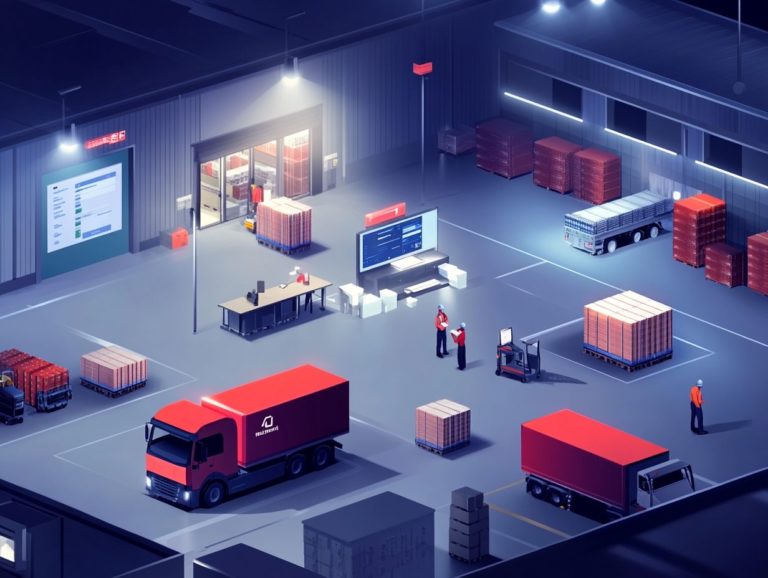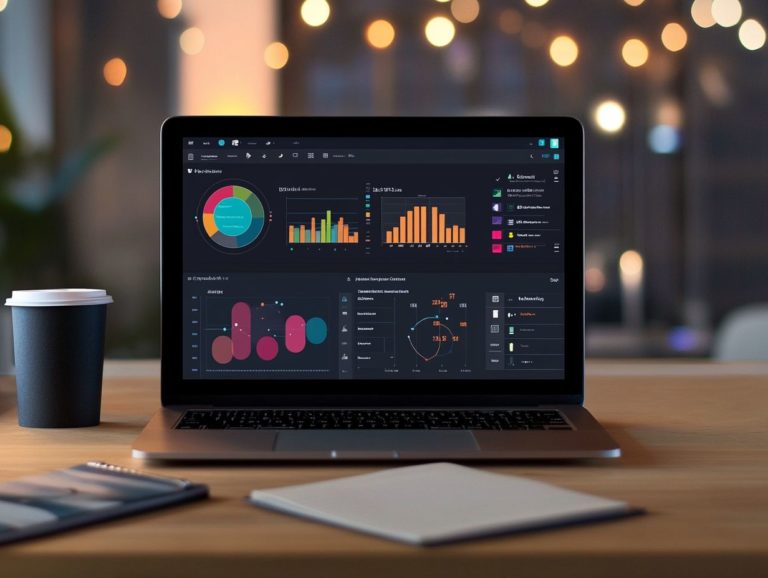11. Best Practices for CRM in Hospitality Industry
In the competitive realm of hospitality, cultivating robust relationships with customers is paramount for success. Customer Relationship Management (CRM) emerges as an indispensable tool for hotels, restaurants, and various sectors within hospitality. It enables you to enhance guest experiences and nurture loyalty.
This article delves into the essential components of an effective CRM strategy, such as data collection, personalization, and communication. It also outlines best practices for implementation and methods to gauge your success, offering valuable insights to elevate your hospitality business to new heights.
Contents
- Key Takeaways:
- Understanding Customer Relationship Management (CRM) in the Hospitality Industry
- Key Components of a Successful CRM Strategy
- Best Practices for Implementing CRM in the Hospitality Industry
- Measuring the Success of CRM in the Hospitality Industry
- Frequently Asked Questions
- What are the best practices for CRM in the hospitality industry?
- Why is personalization a crucial aspect of CRM in the hospitality industry?
- How can CRM software integration benefit the hospitality industry?
- What are some effective ways to collect customer data for CRM in the hospitality industry?
- How can implementing loyalty programs benefit a hospitality business?
- Why is proper training essential for effective CRM utilization in the hospitality industry?
Key Takeaways:

- Customer Relationship Management (CRM) is crucial for the hospitality industry as it helps build strong relationships with customers and improves their overall experience.
- Collecting and analyzing customer data, personalizing interactions, and utilizing effective communication channels are essential components of a successful CRM strategy.
- Implementing CRM requires proper training for staff, utilizing technology and tools, and creating a positive customer experience to achieve success in the hospitality industry.
Understanding Customer Relationship Management (CRM) in the Hospitality Industry
Grasping the nuances of Customer Relationship Management (CRM) in the hospitality industry is essential for businesses striving to elevate customer engagement and retention. By adeptly implementing CRM strategies, hotels and restaurants can refine their operations, enrich customer service, and leverage customer data to cater to individual needs.
Operational Customer Relationship Management drives success in the hospitality industry. It helps manage the customer lifecycle, ensuring that every interaction nurtures satisfaction and loyalty. As you seek to optimize your CRM framework, contemplate how to integrate technology seamlessly, plan your budget thoughtfully, and garner leadership support to drive successful outcomes.
Defining Customer Relationship Management
Customer Relationship Management (CRM) is your go-to strategy for managing interactions with customers, streamlining operations, and elevating the overall customer experience. This approach involves identifying and analyzing customer data to enhance engagement, which is essential for nurturing long-term relationships.
Key components include sales efficiency, which means helping your sales team close deals faster, and customer data analysis, allowing you to tailor marketing strategies to meet unique needs. To bring these strategies to life, organizations often rely on robust software tools like Salesforce Sales Cloud, celebrated for its extensive feature set, and Microsoft Dynamics 365, which integrates seamlessly with other business applications.
Together, these tools enable you to optimize workflows, boost customer satisfaction, and ultimately drive growth.
Importance of Customer Relationship Management in the Hospitality Industry
The significance of CRM in the hospitality industry is paramount. CRM enhances customer engagement and retention, paving the way for business success. By leveraging best CRM practices for customer retention, you can streamline your operations while cultivating stronger relationships with your guests.
Take a cue from major chains like Marriott, which have adeptly employed CRM in restaurant management to customize their marketing campaigns. They ensure promotions resonate with individual preferences and past booking behavior. This level of personalization elevates the guest experience and significantly boosts the likelihood of repeat visits.
Data-driven insights from CRM analytics help you anticipate customer needs, refine service delivery, and address issues proactively before they escalate. These examples show how powerful CRM can turn guest interactions into unforgettable experiences.
Key Components of a Successful CRM Strategy
A successful CRM strategy relies on several essential components that seamlessly integrate to enhance customer experiences and streamline operations. These elements include meticulous data collection and analysis, personalized interactions, and well-established communication channels.
By focusing on these key areas, you can create a more cohesive and effective approach to managing customer relationships.
Data Collection and Analysis

Data collection and analysis are essential for gaining deep insights into customer behaviors and preferences. This allows your business to make informed decisions and optimize your Customer Relationship Management (CRM) setup.
By employing various methods such as surveys, interviews, and analyzing large sets of data to find patterns, you can gather comprehensive information that captures the intricacies of customer interactions.
Ensuring high data quality is vital for your success! After all, inaccurate data can lead you down the wrong path, resulting in misguided strategies that harm customer relationships.
Implementing effective ways to measure success, like customer satisfaction scores and engagement rates, is crucial for assessing your achievements.
With thorough data analysis, you can tailor your services and marketing efforts, enhancing customer engagement and creating personalized experiences that foster loyalty and satisfaction.
Personalization and Customization
Personalization and customization are crucial components of today s CRM strategies. They allow you to tailor your services to meet the unique needs and preferences of your customers.
In a competitive landscape, you can leverage CRM systems to analyze customer behavior and data. This enables you to create tailored recommendations that resonate more effectively with your audience.
For instance, imagine an online retailer using CRM tools to suggest products based on past purchases. This significantly enhances the shopping experience for customers.
You can craft customized marketing campaigns that speak directly to segmented customer groups, ensuring your message aligns perfectly with their interests.
Picture a travel agency utilizing CRM insights to offer personalized vacation packages based on previous trips. This approach fosters deeper customer engagement and loyalty.
Effective Communication Channels
Establishing effective communication channels is essential for any CRM strategy. It allows smooth interaction between your business and its customers across various platforms.
By adopting a multichannel approach, you can address diverse customer preferences, significantly increasing user satisfaction with personalized experiences.
Integrating social media, email, live chat, and mobile apps into a cohesive framework enables you to provide timely responses and cultivate stronger relationships.
For these strategies to thrive, it s imperative that leadership actively supports and invests in these initiatives.
By advocating for improved communication, leaders can inspire the entire organization to adopt these channels, ultimately fostering customer loyalty and enhancing brand perception.
Best Practices for Implementing CRM in the Hospitality Industry
Embrace best practices for successful CRM implementation in the hospitality industry, including thorough training and harnessing cutting-edge technology. Staying updated with the top trends in CRM is essential for prioritizing the creation of an exceptional customer experience.
Training and Education for Staff
Comprehensive training and education for your staff are crucial for the successful implementation of CRM. This ensures they are well-equipped to utilize the system effectively.
Great training boosts user satisfaction and empowers your team to shine when responding promptly and accurately to customer inquiries.
Well-trained personnel can harness CRM tools to track customer interactions, personalize experiences, and streamline communication, ultimately enhancing relationships with guests.
For instance, many leading hotels have adopted ongoing workshops that emphasize using CRM data to anticipate customer needs. Others have implemented role-playing sessions to sharpen problem-solving skills.
These initiatives have proven effective in elevating guest experiences and building loyalty, demonstrating the undeniable connection between staff training and CRM effectiveness in the hospitality sector.
Start transforming your customer experience today with these powerful CRM strategies!
Utilizing Technology and Tools

Utilizing the right technology and tools is essential for enhancing customer service and managing your CRM efforts effectively.
In the fast-paced hospitality sector, choosing the right CRM solution is crucial. It can significantly influence both operations and customer relationships.
Many establishments are looking for platforms that streamline processes while respecting budgeting constraints. This ensures maximum efficiency without overspending.
When comparing leading options like Oracle CRM and Pipedrive, consider their unique features and benefits. Oracle CRM, renowned for robust analytics and scalability, excels in larger enterprises. In contrast, Pipedrive boasts a user-friendly interface and affordability, making it an excellent choice for smaller operations.
Understanding these distinctions enables you to make informed decisions that align with your specific needs and financial planning.
Creating a Positive Customer Experience
Creating a positive customer experience is essential for cultivating loyalty and boosting retention rates, especially in the hospitality sector.
By implementing thoughtful strategies at every stage of the customer lifecycle, you can ensure a seamless journey that resonates with your clientele.
For example, during the pre-stay engagement phase, you can use personalized email campaigns featuring tailored offers based on past visit behaviors. This helps capture guests’ attention even before they arrive.
While they re staying with you, enhancing the experience with personalized services like remembering their preferences for room amenities or dining choices creates an inviting atmosphere that makes them feel valued.
After check-out, thoughtful follow-ups, such as thank-you emails with discounts for future stays, can leave a lasting impression. This encourages your customers to return and share their positive experiences with others.
Measuring the Success of CRM in the Hospitality Industry
Measuring the success of CRM initiatives in the hospitality industry requires tracking performance metrics that directly correlate with customer satisfaction and align with your overall business goals. Implementing the 7 CRM best practices for digital marketing can enhance these efforts.
By focusing on these key metrics, you can gain valuable insights into the effectiveness of your efforts and make informed decisions to enhance both guest experiences and operational efficiency.
Key Metrics to Track
Key metrics in your CRM include performance indicators that provide insights into customer satisfaction, engagement, and overall success.
Among these, the Net Promoter Score (NPS) is a vital measure of customer loyalty and the likelihood of referrals. Customer Lifetime Value (CLV) shows how much a customer is worth to your business over time, providing strategic insights that are essential for retention efforts.
Monitoring churn rates helps identify patterns that could signal potential customer loss, enabling you to take proactive measures.
Analytical CRM tools are invaluable for collecting, tracking, and interpreting these metrics. By leveraging data analytics, you can uncover trends, make informed decisions, and ultimately enhance the customer experience, driving sustained growth for your organization.
Adapting and Improving the Strategy
Adapting and refining your CRM strategy is crucial for keeping up with the ever-evolving landscape of customer expectations and industry standards.
By regularly reviewing these strategies using performance metrics and customer feedback, you can ensure your business remains in tune with your clientele’s needs.
This proactive stance allows you to spot trends, identify pain points, and leverage data-driven insights to make informed decisions.
As you look at how customers interact with your business and analyze satisfaction levels, you can pivot your approach, tailoring communications and offerings to cultivate deeper connections.
These thoughtful adjustments not only enhance customer engagement but also significantly improve retention rates, fostering a loyal customer base that feels genuinely valued and understood.
Frequently Asked Questions

What are the best practices for CRM in the hospitality industry?
The best practices for CRM in the hospitality industry include:
- Personalization: Tailoring experiences and services to individual customers.
- Integration: Connecting CRM systems with other hospitality software for efficient data management.
- Multichannel Communication: Engaging customers through email, social media, and mobile apps.
- Data Management: Collecting, organizing, and analyzing data accurately and in a timely manner.
- Loyalty Programs: Offering rewards and incentives to loyal customers.
- Training: Ensuring employees are well-trained on how to use CRM systems effectively.
Why is personalization a crucial aspect of CRM in the hospitality industry?
Personalization is crucial in the hospitality industry as it allows businesses to cater to the specific needs and preferences of their customers. By personalizing experiences and services, businesses create more memorable and enjoyable stays, leading to higher customer satisfaction and loyalty.
How can CRM software integration benefit the hospitality industry?
CRM software integration benefits the hospitality industry in several ways:
- Making processes easier: Integration eliminates manual data entry and workflows become more efficient.
- Enhanced data management: Real-time data syncing ensures information is accurate and up to date.
- Improved communication: Integration enables better communication between departments, resulting in better service delivery.
- Cost savings: Reducing duplicate software and data entry cuts costs for the business.
What are some effective ways to collect customer data for CRM in the hospitality industry?
Effective ways to collect customer data include:
- Online bookings: Collecting data during online reservation processes.
- Social media: Gathering customer information through social media platforms.
- Surveys: Conducting surveys to collect feedback and preferences.
- Loyalty programs: Requiring data collection for enrollment in loyalty programs.
- In-person interactions: Gathering data during check-in or through interactions with staff.
- Third-party data: Utilizing external data sources to enhance customer profiles.
How can implementing loyalty programs benefit a hospitality business?
Implementing loyalty programs offers several benefits:
- Increased customer retention: Loyalty programs incentivize customers to return.
- Higher spending: Loyal customers typically spend more on each visit.
- Word-of-mouth marketing: Satisfied loyalty program members spread positive recommendations, attracting new customers.
- Valuable data: Loyalty programs provide businesses with essential customer data for targeted marketing and personalization.
Why is proper training essential for effective CRM utilization in the hospitality industry?
Proper training is vital for effective CRM utilization as it ensures employees understand how to use the system efficiently. This dramatically improves data management, enhances customer service, and boosts customer satisfaction. Without proper training, employees may face challenges in utilizing the CRM system, leading to inefficiencies and potential data errors.






